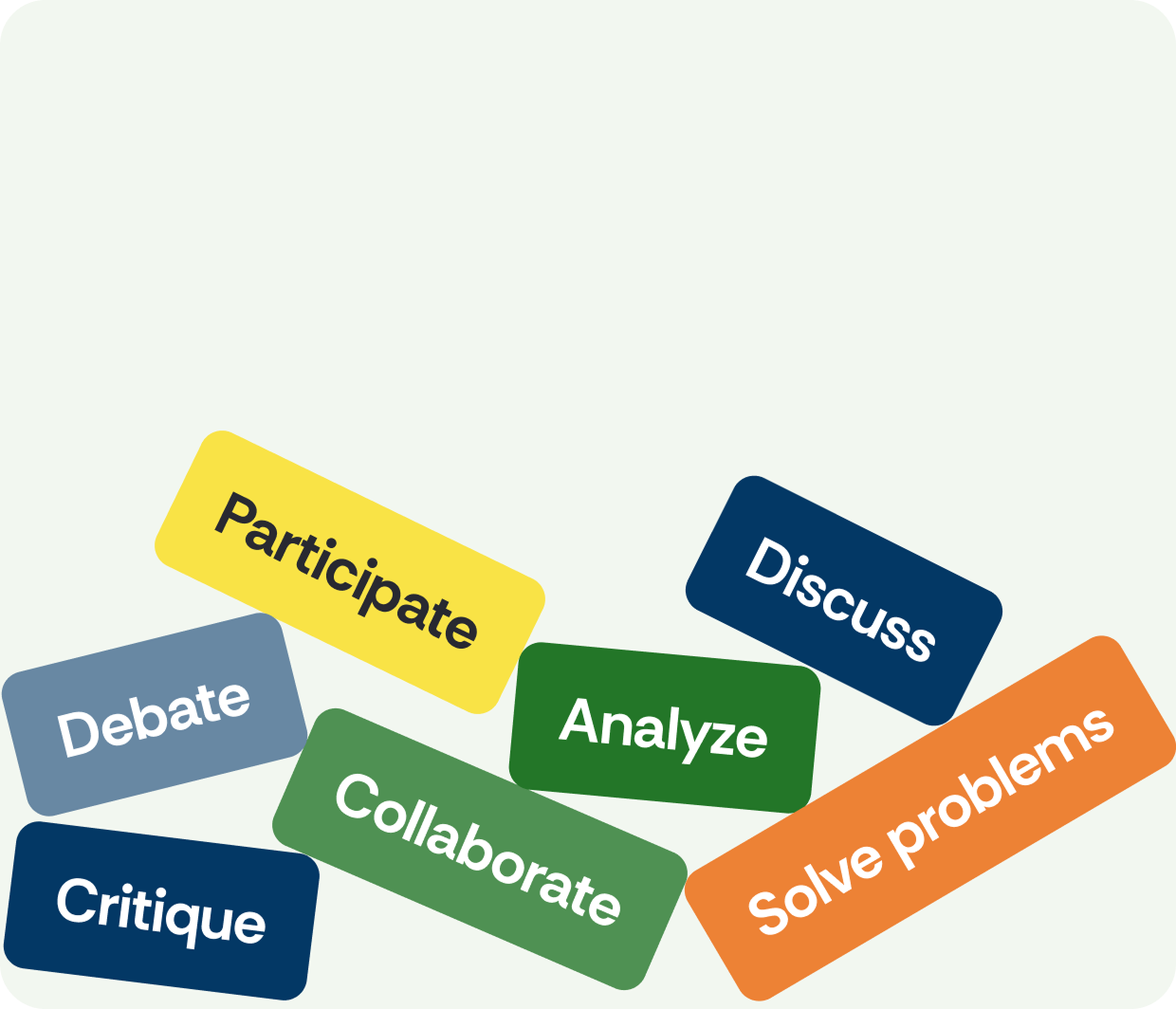Experiential Learning supported by FeedbackFruits
Transform learning into action—immerse students in authentic, hands-on experiences that foster critical thinking, adaptability, and deeper knowledge application, preparing them to navigate complex real-world challenges with confidence.

What is experiential learning?
Experiential learning is a teaching approach that emphasizes learning through direct experience, reflection, and application. Rather than passively absorbing information, students engage in hands-on activities, real-world challenges, and reflective practices that deepen understanding and skill development. This approach enhances critical thinking, adaptability, and the ability to apply knowledge in diverse, practical contexts.

Why experiential learning?
Experiential learning engages students in active, real-world experiences that promote deeper understanding, skill development, and long-term retention. Research supports that learning through experience enhances critical thinking, problem-solving, and adaptability, as students apply knowledge in authentic contexts. By integrating reflection and application, this pedagogy bridges theory and practice, preparing learners to navigate complex challenges with confidence and competence.
Book a demoBetter performance
Empirical evidence shows that students participating in experiential learning outperform their peers in traditional settings, with a measurable improvement in performance (effect size d = 0.43), highlighting the effectiveness of hands-on, experience-based education.

Burch et al., 2019
A Meta‐Analysis of the Relationship Between Experiential Learning and Learning Outcomes
Real-life skills development
Experiential learning fosters critical thinking, communication, and confidence. Research shows that these environments effectively develop teamwork and problem-solving skills, preparing students for real-world challenges
.png)
Duchatelet et al., 2023
Features of Experiential Learning Environments in Relation to Generic Learning Outcomes in Higher Education: A Scoping Review
Enhanced understanding
Learning is most effective when it follows a cycle of concrete experience, reflection, conceptualization, and experimentation. This process deepens understanding, enhances skill development, and fosters adaptability by integrating real-world experience into learning.

Kolb, 2015
Experiential Learning: Experience as the source of Learning and Development Second Edition

How does FeedbackFruits support experiential learning?
Experiential learning is built on real-world application, active participation, and collaboration, all of which can be effectively supported by FeedbackFruits Learning Design System.
By integrating group work, peer interactions, and structured discussions, educators can create engaging and interactive learning experiences that promote deep understanding and practical skill development. FeedbackFruits enables this by facilitating feedback processes, fostering meaningful collaboration, and providing actionable insights into student progress, ensuring that learning is dynamic and applied.
With learning activities that encourage group and peer evaluation, group discussions, and structured teamwork, FeedbackFruits helps educators design immersive learning experiences where knowledge is actively constructed, shared, and applied in authentic contexts.
By integrating group work, peer interactions, and structured discussions, educators can create engaging and interactive learning experiences that promote deep understanding and practical skill development. FeedbackFruits enables this by facilitating feedback processes, fostering meaningful collaboration, and providing actionable insights into student progress, ensuring that learning is dynamic and applied.
With learning activities that encourage group and peer evaluation, group discussions, and structured teamwork, FeedbackFruits helps educators design immersive learning experiences where knowledge is actively constructed, shared, and applied in authentic contexts.
Get started with experiential learning using our pre-made learning templates
These templates—designed by experienced educators—offer proven structures for implementing experiental learning. Simply select a template, customize it, and launch engaging activities in minutes.
Browse all templatesExperiential learning, directly within your LMS
FeedbackFruits integrates seamlessly with your Learning Management System, making it simple to incorporate experiential learning activities into your existing courses. Whether you teach online, hybrid, or face-to-face, FeedbackFruits ensures that activating student participation is just a few clicks away—no additional overhead, no steep learning curve.





Explore our free resources about experiential learning

Feedback and assessment in higher education
A comprehensive guide to help educators design assessment activities that built upon real-world application, active engagement, and collaboration
Read more
What is authentic assessment?
This article introduces authentic assessment, an approach that engage students in authentic experiences and measure their performance.
Read more
Deakin University implemented authentic assessment
At the Faculty of Science, Engineering and Built Environment, Dr. Gunning and her team implemented a 2-year long, multi-faceted project to prepare students for the world of work and encourage lifelong learning.
Read moreSee what FeedbackFruits learning activities can be used to support experiential learning
Experiential learning is hard. FeedbackFruits makes
it easier.
Unlock the full potential of experiential learning and more with the Learning Design System.
Explore the Learning Design System










